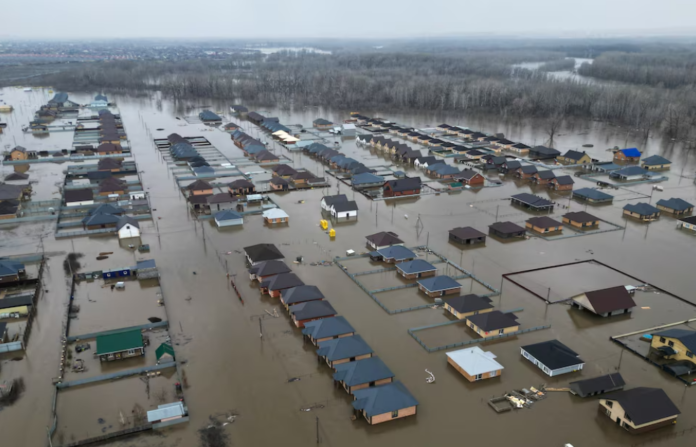Authorities said on Thursday that nearly 12,000 homes in a Russian area bordering Kazakhstan have flooded as a result of the Ural River‘s ongoing rise in water levels, which is likely to cause further flooding, AP News reports.
Thousands of people in the Orenburg area, which is around 1,200 kilometers southeast of Moscow, were forced to evacuate due to the floods after a river dam burst last week due to the pressure of rising waters. Local authorities have declared a state of emergency in the region.
Governor Denis Pasler of Orenburg announced during a televised videoconference with President Vladimir Putin that a total of 11,972 houses are flooded, as well as 16 state medical facilities. Around 20,000 people live in 3,600 houses, all of which might flood very soon due to rising water levels.
Pasler stated that the situation is most dire in the city of Orenburg, the administrative capital of the region, where the Ural River’s water level hit a historical high of 10.87 meters.
Authorities in the areas of Tyumen and Kurgan, which are further east near the Kazakhstan border, are also preparing for potential flooding as water levels rise in local rivers.
According to Russia’s official news agency Tass, floods have also affected Kazakhstan, where officials declared a state of emergency in 10 out of 17 regions of the country. Eight areas were under a state of emergency as of Thursday. Over 98,000 people have been evacuated from the impacted regions there since March.
Video footage from Kazakhstan’s flooded areas shows water rushing along streets, large areas under water, and several residences partially submerged.
The floods are “a natural disaster… the likes of which have not been seen for many years,” stated Kazakh President Kassym-Jomart Tokayev.
He declared last week that “this is, perhaps, the biggest disaster in terms of its scale and consequences in over 80 years.”


